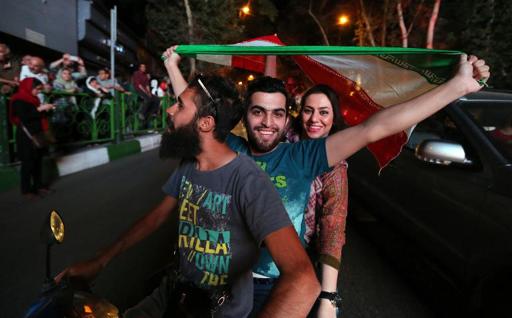A deal with world powers ended a "manufactured crisis" over Iran's nuclear programme, its foreign minister said Wednesday after negotiating the accord,which drew furious objections from US lawmakers.
President Barack Obama faced a bruising battle to sell the deal in Washington as Congressional leaders queued up to denounce it.
In return for curbs on its nuclear programme for at least 10 years, Iran will be freed from Western and UN sanctions that have crippled its economy.
Obama is to hold a news conference Wednesday to try to convince Americans of the benefits of an agreement that has drawn opposition from US allies in the region, including Israel.
Foreign Minister Mohammad Javad Zarif, who led Iran's negotiating team in the final 18 straight days of talks that culminated in Tuesday's deal, said on his return home that common ground had been found with the six powers led by the United States.
"We will take measures, and they will do their part," he told reporters at Tehran's Mehrabad airport.
"It will happen in around four months from now," he said of the deal's formal implementation.
Zarif's comments came after a night of celebrations in Tehran, where his own name was chanted in the streets by joyous Iranians.
Many festooned their cars with balloons and danced in the street to celebrate the prospect of an end to long years of economic hardship caused by Western sanctions.
"Maybe the economy is going to change, especially for the young people. I was thinking about leaving, but now I will stay to see what happens," said Giti, 42, a computer programmer.
The sentiment was shared by most Iranian newspapers.
Financial daily Donyaye Eqtesad said Iran had "entered the post-sanctions age."
"Iran Siege Broken," headlined the moderate daily Ghanoon.
In Washington, however, the deal came under intense scrutiny.
The speaker of the Republican-led US House of Representatives, John Boehner, said it was "likely to fuel a nuclear arms race around the world".
But Zarif hit back at the deal's biggest critic, Israeli Prime Minister Benjamin Netanyahu, head of the region's sole if undeclared nuclear state, who branded the agreement a "historic mistake".
"Netanyahu kicked up a fuss, as he is upset that Iran managed to get sanctions lifted and prevent a manufactured crisis," Zarif said.
British Foreign Secretary Philip Hammond headed to Israel on Wednesday to explain the deal in person. He also voiced hope London could reopen its embassy in Tehran, which was closed in 2011 after being stormed by a mob.
Obama faces hard sell
Iran has always denied seeking an atomic bomb, a stance President Hassan Rouhani reiterated after Tuesday's agreement.
Soon after the deal was announced the White House launched a campaign to stop sceptics at home and abroad from derailing the hard-won accord.
US lawmakers have 60 days to review the agreement but Obama has vowed to use his veto over any attempt to block it.
Under the deal, Iran will cut by about two-thirds the number of centrifuges -- which can make fuel for nuclear power stations but also the core of a nuclear bomb -- from around 19,000 to just over 6,000.
It has also agreed to allow the UN nuclear watchdog tightly controlled access to its military bases, an Iranian official said.
Obama said the accord meant "every pathway to a nuclear weapon is cut off".
"This deal offers an opportunity to move in a new direction. We should seize it," he said, pointing to a broader effort to end the hostility that has persisted ever since the overthrow of the US-backed shah in the Islamic revolution of 1979.
Cooperation against IS
Washington hopes the accord may lead to more cooperation with Iran at an explosive time in the Middle East after the Islamic State jihadist group surged last year, seizing vast swathes of Syria and Iraq.
Russian Foreign Minister Sergei Lavrov said the deal paved the way for a "broad" coalition to fight the Sunni extremist group, which is as hostile to Shiite Iran as it is to the West.
"It removes the barriers -- largely artificial -- on the way to a broad coalition to fight the Islamic State and other terrorist groups," Lavrov said.
But the agreement has alarmed some of America's most important Middle East allies, including Sunni regional power Saudi Arabia.
French Foreign Minister Laurent Fabius said he had accepted an invitation to visit Tehran soon.
With Iran set to reopen for business with the progressive lifting of sanctions, he was likely to be the first in a long line of top diplomats beating a path to Tehran.
France was one of the powers that reached the deal with Iran, along with Britain, China, Germany, Russia and the United States.






















































